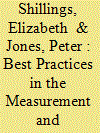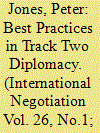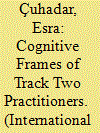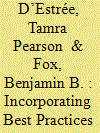|
|
|
Sort Order |
|
|
|
Items / Page
|
|
|
|
|
|
|
| Srl | Item |
| 1 |
ID:
176505


|
|
|
|
|
| Summary/Abstract |
Measuring the impact of Track Two dialogues has proven a difficult challenge for the field over many years. Each dialogue is different, which makes a standardized test difficult to achieve. Moreover, different actors wish to measure different things: “value” for money; impact on the conflict; how certain facilitation techniques work; and others. In this article, we present a model that can be used to measure the impact of a dialogue over time, while also encouraging reflective practice in the field. This “Reflective Practice Model” can be used to provide a snapshot of a particular moment – or as a vehicle for the accumulation of a series of such moments – thereby providing a means to observe and measure changes as the dialogue goes on.
|
|
|
|
|
|
|
|
|
|
|
|
|
|
|
|
| 2 |
ID:
176501


|
|
|
|
|
| Summary/Abstract |
While “Track Two Diplomacy” has been intensively researched since its founding some 60 years ago, much remains to be done to explore important gaps in our understanding of these dialogues. Track Two presents unusual research problems, given its operational and often confidential nature. The contributions to this special issue of International Negotiation tackle some of the key issues confronting the field in an effort to present where we stand in terms of best practices and where further thought and research is required.
|
|
|
|
|
|
|
|
|
|
|
|
|
|
|
|
| 3 |
ID:
176506


|
|
|
|
|
| Summary/Abstract |
This article explores the extent to which framing affects Track Two diplomacy practice and especially how the cognitive frames used by practitioners shape the design of their interventions. The framing effect is pervasive and shapes every type of action. Peacebuilding and Track Two work are no exception. Track Two practitioners often rely on frames as cognitive heuristics when they design their interventions. This article reports on the results of an online survey of 273 participants, using measures based on categories identified in two previous qualitative studies using the grounded theory approach. Four main frames used by practitioners are presented, along with examples from practice: psychologists, constructivists, capacity-builders, and realistic negotiators. Finally, the implications of being captive to the framing effect for Track Two practice are discussed. Steps are suggested towards making more deliberative and reflective context-specific decisions about interventions rather than “fast thinking” based on heuristics and bias.
|
|
|
|
|
|
|
|
|
|
|
|
|
|
|
|
| 4 |
ID:
176504


|
|
|
|
|
| Summary/Abstract |
This article examines best practices in local ownership of Track Two diplomacy. Taking as a starting point the idea that best practices change over time as conflicts and social responses to them change, the article seeks out recent innovations and practices in Track Two diplomacy, focusing on practices of local ownership. A series of two reflective practice workshops with facilitators of Track Two processes offer insights on local ownership in current Track Two diplomacy. More in-depth examination of the Georgian-South Ossetian case illustrates an example of increasing local ownership developing over time during a ten year Track Two process. Together, the reflective practice workshops and the case study suggest team approaches to Track Two diplomacy so that insiders and outsiders work together as a team to facilitate, bringing the strengths of both insiders and outsiders to Track Two processes.
|
|
|
|
|
|
|
|
|
|
|
|
|
|
|
|
| 5 |
ID:
176502


|
|
|
|
|
| Summary/Abstract |
Track Two processes were developed to facilitate movement in difficult international conflicts. Since Montville first coined the term, Track Two processes have considered deliberate and strategic ways to bring together adversaries in unofficial, private face-to-face interactions that allow for joint analysis and mutual learning. Such processes create the conditions for more nuanced problem definition and solution exploration. Ideally, these insights are then transferred into official peace processes, policymaking and decision-making. Transfer acknowledges a strategic dimension to planning for change; Track Two approaches abridge and accelerate the long-term accumulation approach by the strategic choice of participants, agenda and goals. This article reviews and summarizes our knowledge to date about how best to encourage Track Two inputs into negotiation and other Track One diplomatic efforts. It then offers a checklist for designing initiatives to best promote both intergroup learning and timely transfer to generate effective change.
|
|
|
|
|
|
|
|
|
|
|
|
|
|
|
|
| 6 |
ID:
176503


|
|
|
|
|
| Summary/Abstract |
This article unpacks the development of key ideas and debates which surround the ethical issues of Track Two. It defines what is meant by ‘Track Two’ and discusses how ethics might best be applied in practice to these dialogues. The ethical dimensions of four key issues are explored: accountability; the basis on which third parties feel they are entitled to intervene; the problem of dealing with actors who have committed atrocities; and ethical questions surrounding secrecy or confidentiality which is often required. The article suggests several ways forward in terms of creating a mechanism to enable practitioners to assist each other with the challenges they face. The article takes the view that a ‘hard and fast’ set of ethics may not be appropriate for the field, as each intervention is quite different, but rather that a set of ‘reflective questions’ should be developed to help practitioners confront ethical issues.
|
|
|
|
|
|
|
|
|
|
|
|
|
|
|
|
| 7 |
ID:
176507


|
|
|
|
|
| Summary/Abstract |
The field of peace and conflict studies has been maturing over the past few decades, not least thanks to the continual epistemological contestation between its philosophy and methodology. As a consequence, the methods of conflict resolution practice have been evolving. Dominated by realist approaches of conflict management during the Cold War, the field in the 1990s relied heavily on neo-liberal theories of economic interdependence, democracy building, and interest-based negotiations that can bring win-win outcomes. By the late 2000s, as the constructivist paradigm and critical theory started gaining ground in academia, the conceptual conversation shifted toward the possibilities of building inclusive societies and achieving structural and cultural peace via conflict transformation, rather than resolution, as the respective methodology.
|
|
|
|
|
|
|
|
|
|
|
|
|
|
|
|
| 8 |
ID:
176508


|
|
|
|
|
| Summary/Abstract |
The articles in this issue present a wide range of findings. First, the field continues to grapple with definitional issues: different types of projects aimed at different outcomes and audiences. More care needs to be given by each dialogue to define rigorously what it is trying to do and why. Second, fundamental lessons have emerged over the past six decades, which must be learned and observed by those active in this field, even as they seek to push the boundaries of theory and practice. Third, while it is generally agreed that the field must become more inclusive, both in terms of people and interests, and also in terms of encouraging local ownership and more transformative projects, a one-size-fits-all approach will not work; each dialogue should be viewed as unique. Finally, the field is a dynamic and evolving one. What seems to be best practice today may not be so tomorrow.
|
|
|
|
|
|
|
|
|
|
|
|
|
|
|
|
|
|
|
|
|